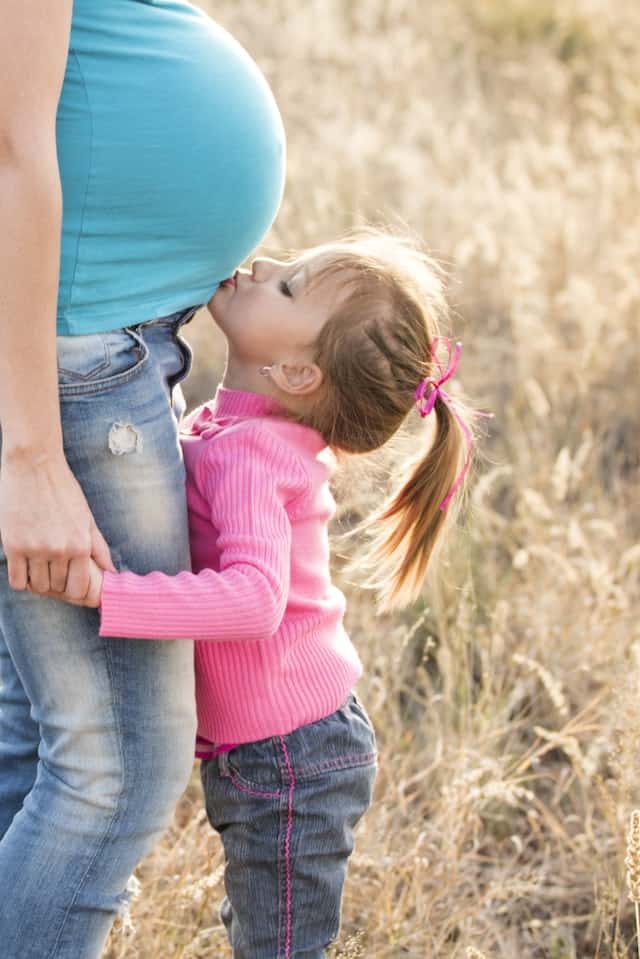Pregnancy is a beautiful and transformative experience for many women, but it can also be a time of uncertainty and anxiety. One common question that arises is whether children can sense the changes that come with pregnancy.
Parents may notice their child acting differently or seeming to have an intuition about the pregnancy, but is there any scientific evidence to support this idea?
Understanding Kids’ Sixth Sense
While there is no concrete proof that children can sense pregnancy, many parents and experts believe that kids have a sixth sense that allows them to pick up on subtle changes in their environment. This could include changes in a mother’s physical appearance, behavior, or emotional state.
Some children may also be more perceptive to the hormonal changes that occur during pregnancy, which can cause mood swings, fatigue, and other symptoms.
Physical and Emotional Changes in Pregnant Mothers

Pregnancy can cause a number of physical and emotional changes in women, including weight gain, morning sickness, and mood swings. These changes can be difficult for some children to understand, especially if they are too young to fully grasp the concept of pregnancy.
It’s important for parents to communicate openly with their children about what is happening and to provide reassurance that everything is normal and okay.
Key Takeaways
- While there is no concrete proof that children can sense pregnancy, many parents and experts believe that kids have a sixth sense that allows them to pick up on subtle changes in their environment.
- Pregnancy can cause a number of physical and emotional changes in women, including weight gain, morning sickness, and mood swings.
- It’s important for parents to communicate openly with their children about what is happening and to provide reassurance that everything is normal and okay.
Understanding Kids’ Sixth Sense
Many people believe that children have a sixth sense that allows them to perceive things that adults cannot. This idea is particularly prevalent when it comes to pregnancy, with many parents reporting that their children seem to know that a new baby is on the way before they do. But is there any scientific basis to this belief?
While there is no concrete evidence to support the idea of a sixth sense, there are several factors that may help explain why children seem to be more attuned to changes in their environment than adults. For one thing, children are more observant than adults and often notice subtle changes in behavior and routine that adults overlook.
Additionally, children are more in tune with their emotions and those of the people around them. This heightened emotional awareness may allow them to pick up on subtle cues that indicate a new baby is on the way, such as changes in the mother’s mood or behavior.
It’s also possible that children pick up on physical changes in the mother’s body that signal a pregnancy, such as weight gain or changes in her posture or gait. While these changes may be subtle, children are often more attuned to physical differences than adults.
Overall, while there is no scientific evidence to support the idea of a sixth sense, there are several factors that may help explain why children seem to be more aware of changes in their environment than adults.
Whether it’s through heightened observation skills, emotional awareness, or physical sensitivity, children are often more in tune with their surroundings than we give them credit for.
Physical and Emotional Changes in Pregnant Mothers

Pregnancy is a unique experience for every mother, and it brings about significant physical and emotional changes. Here are some of the most common changes that pregnant mothers experience:
1. Physical Changes
- Weight gain: As the baby grows, a pregnant mother’s weight will increase. The amount of weight gain can vary from person to person, but on average, mothers gain around 25-35 pounds during pregnancy.
- Morning sickness: Many pregnant mothers experience nausea and vomiting during the first trimester, commonly known as morning sickness. This is caused by hormonal changes in the body.
- Fatigue: As the body works to support the growing baby, pregnant mothers often feel more tired than usual. This can make it difficult to perform everyday tasks.
- Body changes: The body undergoes many changes during pregnancy, including an increase in blood volume, changes in hormone levels, and stretching of the skin and muscles.
2. Emotional Changes
- Mood swings: Hormonal changes during pregnancy can cause mood swings, making pregnant mothers feel happy one moment and sad the next.
- Anxiety: Pregnancy can be a time of worry and anxiety, especially for first-time mothers. Concerns about the health of the baby and the changes that come with motherhood can be overwhelming.
- Excitement: Despite the challenges, many pregnant mothers feel excited about the changes that come with pregnancy and the prospect of becoming a parent.
In conclusion, pregnancy is a time of significant physical and emotional changes for mothers. While every experience is unique, understanding these changes can help mothers prepare for the journey ahead.
Kids’ Observations and Reactions
Children, especially toddlers, are observant and can pick up on changes in their environment. When a woman is pregnant, there are several changes that occur in her body, and kids may notice these changes even before they are told about the pregnancy.
Some children may become clingy or act up more than usual when they sense that their mother is pregnant. This behavior is often due to the child’s fear of change and the uncertainty that comes with it. They may become more attached to their mother and want to be close to her at all times.
In some cases, children may exhibit regression in their behavior, such as bedwetting or thumb-sucking, as a way to cope with the changes that are happening around them. This behavior is often temporary and should resolve itself once the child becomes more comfortable with the situation.
It is important to note that not all children will react the same way to a pregnancy. Some may not show any noticeable changes in their behavior, while others may be more observant and curious about the changes happening in their mother’s body.
Overall, it is important for parents to be aware of their children’s reactions and behaviors when they are pregnant. By understanding their child’s perspective and providing reassurance and support, parents can help their children adjust to the changes that come with a new sibling.
Effects on Toddlers and Older Children

Toddlers and older children can also sense changes in their mother’s body during pregnancy. They may become more attentive and curious about their mother’s growing belly. Some children may become more affectionate and express their love more openly.
However, pregnancy can also cause stress and anxiety in children, especially if they sense changes in their routine or if they feel that their mother’s attention is divided. Some children may become angry or exhibit behavioral changes as a result of these feelings.
It is important for parents to communicate with their children about the changes that are happening and to involve them in the pregnancy process as much as possible. This can help children feel more included and reduce anxiety and stress.
Additionally, children may experience changes in their self-confidence during pregnancy. They may feel neglected or worry that they will not be loved as much once the new baby arrives. Parents can help alleviate these fears by reassuring their children that they will always be loved and that the new baby will not change that.
Overall, while toddlers and older children can sense pregnancy, the effects can vary widely depending on the child’s personality, age, and individual circumstances. It is important for parents to be aware of their child’s feelings and to provide support and reassurance throughout the pregnancy.
Preparing for a New Sibling
When a new baby is on the way, parents often wonder how their other children will react to the news. It’s common for kids to sense pregnancy, even before the mother starts showing physical signs. As a result, it’s important to prepare your child for the arrival of their new sibling.
One way to do this is to involve your child in the preparation process. This can include setting up the nursery together or letting your child pick out a special toy for the new baby. By involving your child, they will feel more connected to the new addition to the family.
It’s also important to talk to your child about what to expect when the new baby arrives. This can include explaining that babies cry a lot and need a lot of attention. It’s important to emphasize that while the new baby will require a lot of attention, you still love your other child just as much as before.
Another way to prepare your child for the new sibling is to read books about new babies and siblings. This can help your child understand the changes that are coming and make them feel more comfortable with the situation.
Overall, preparing your child for the arrival of a new sibling can help make the transition smoother for everyone involved. By involving your child in the preparation process and talking to them about what to expect, you can help them feel more connected to the new baby and less anxious about the changes to come.
Anecdotal Evidence and Academic Research
There is a lot of anecdotal evidence suggesting that kids can sense pregnancy. Many parents have reported that their children acted differently around them when they were pregnant, even before they knew they were pregnant themselves.
Some children have been said to become clingy or protective of their pregnant parent, while others have been reported to be more aggressive or distant. However, anecdotal evidence is not enough to prove that kids can sense pregnancy, and there is little academic research on the subject.
One study published in the journal Infant Behavior and Development found that infants as young as 6 months old were able to differentiate between the scent of breast milk from lactating women and the scent of breast milk from non-lactating women.
The study suggests that infants may be able to detect hormonal changes in their mothers that occur during pregnancy and lactation. However, this study does not prove that older children can sense pregnancy.
Another study published in the Journal of Reproductive and Infant Psychology found that children between the ages of 2 and 5 were able to identify pictures of pregnant women significantly more often than pictures of non-pregnant women. The study suggests that children may be able to recognize physical changes in pregnant women, but it does not prove that they can sense pregnancy in any other way.
Overall, while there is some anecdotal evidence and a few studies that suggest that kids may be able to sense pregnancy, there is not enough evidence to say for sure whether or not this is true. More research is needed to determine if kids can truly sense pregnancy and, if so, how they are able to do so.
Maintaining Normalcy and Confidence
When a family is expecting a new baby, it can be an exciting and sometimes overwhelming time for everyone, including the children. While some children may have a natural curiosity about pregnancy and birth, others may feel anxious or unsure about what to expect.
It is important for parents to help their children maintain a sense of normalcy and confidence during this time.
One way to maintain normalcy is to keep to regular routines as much as possible. Children thrive on routine and predictability, and maintaining their usual schedules can help them feel secure and grounded.
This can include regular meal times, bedtime routines, and activities such as sports or hobbies. It is also important to continue to spend quality time with each child, even as the family prepares for the new arrival.
Another way to help children feel confident during this time is to involve them in the preparation process. Depending on their age and maturity level, children can help with tasks such as decorating the nursery, choosing baby clothes, or even attending doctor’s appointments.
This can help them feel like an important part of the family and give them a sense of ownership over the new baby.
Parents should also be aware of any signs of dependency or anxiety in their children and address them as needed. This may include providing extra reassurance, answering questions honestly and age-appropriately, or seeking professional support if necessary.
Overall, maintaining normalcy and confidence is key when preparing for a new baby. By keeping routines consistent, involving children in the preparation process, and addressing any concerns or anxieties, parents can help their children feel secure and excited about the upcoming changes.
Communicating the Concept of Pregnancy
When it comes to communicating the concept of pregnancy to children, it’s important to keep in mind their age and level of understanding. Younger children may have a harder time grasping the concept, while older children may have more questions and concerns.
One way to start the conversation is by talking about conception and how a baby is formed. Using age-appropriate language and visual aids, such as diagrams or books, can help children understand the process. It’s important to emphasize that pregnancy can only occur when a sperm fertilizes an egg, and that it usually happens during sexual intercourse.
Once children understand the basics of conception, it’s important to discuss the signs and symptoms of pregnancy. This can include changes in a woman’s body, such as morning sickness, fatigue, and a growing belly. It’s also important to talk about home pregnancy tests and how they work.
Children may have questions and concerns about how a new baby will affect their lives. It’s important to reassure them that they will still be loved and cared for, and to involve them in the preparations for the new arrival. This can include helping to decorate the nursery or choosing baby clothes.
Overall, communicating the concept of pregnancy to children can be a sensitive and complex process. By using clear and neutral language, and being open to questions and concerns, parents can help their children understand and prepare for the exciting changes ahead.
Related post: Question Mark on Pregnancy Test
Frequently Asked Questions
Can young children sense pregnancy?
It is possible for young children to sense pregnancy, although the extent to which they can do so is not fully understood. Some children may pick up on physical and emotional changes in their mother, while others may simply notice that something is different.
Do toddlers have a sixth sense for pregnancy?
There is no scientific evidence to suggest that toddlers have a sixth sense for pregnancy. However, some parents may report that their toddler seemed to know that they were pregnant before they did.
How do babies react to their mother’s pregnancy?
Babies may react differently to their mother’s pregnancy depending on their age and temperament. Some babies may become more clingy or fussy, while others may seem indifferent. In some cases, babies may even become more active in the womb.
Can babies sense pregnancy in other women?
There is no evidence to suggest that babies can sense pregnancy in other women. However, some babies may be more sensitive to changes in their environment and may pick up on subtle cues from other people.
Why do some toddlers become clingy during their mother’s pregnancy?
Toddlers may become clingy during their mother’s pregnancy for a variety of reasons. They may sense that something is different or they may pick up on their mother’s emotional state. Additionally, toddlers may be seeking extra attention and reassurance during this time of change.
Is it common for children to know their mother is pregnant before she does?
While it is not uncommon for children to pick up on subtle cues that their mother is pregnant, it is unlikely that they would know before she does. Most women become aware of their pregnancy through physical symptoms or a missed period.

Iesha is a loving mother of 2 beautiful children. She’s an active parent who enjoys indoor and outdoor adventures with her family. Her mission is to share practical and realistic parenting advice to help the parenting community becoming stronger.
